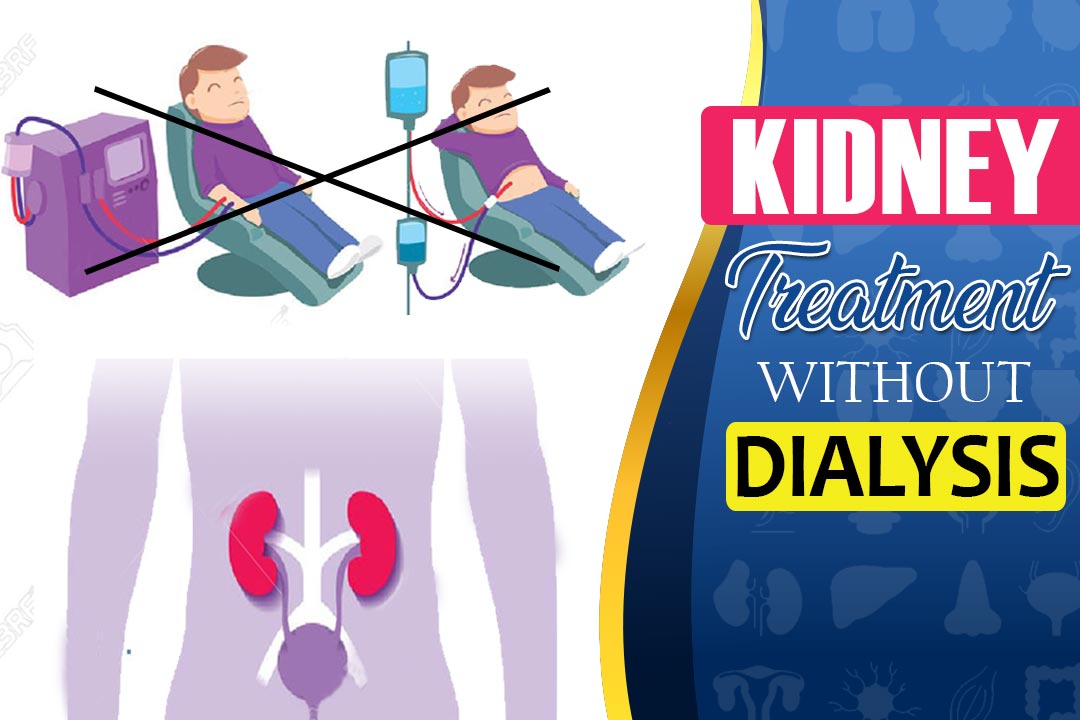Is kidney treatment without dialysis possible?

Dialysis is a type of Allopathic treatment. It is an artificial procedure used when the kidneys become diseased and lose their functionality. At this stage, dialysis executes some of the functions of the kidneys to help a patient to survive. Mainly, this treatment procedure removes excess fluid, wastes, and toxins from the blood to provide the body with clean blood to function. This procedure is helpful but doesn’t help in the betterment of the health of the kidneys. Besides, if this treatment procedure is used more than a couple of times, then it may induce several health complications too. So, opting for kidney treatment without dialysis can prove a better solution.
Kidneys and their disorders
Kidneys are a couple of bean look-alike organs that are located on the right and left the side of the body under the rib cage. These organs are made up of millions of nephrons which act as filters. Due to these filters, mainly, kidneys perform blood filtration processes and hence known as filtering organs. Some significant functions of the kidneys go as below:
- Eliminating wastes and toxins from the blood
- Maintaining an ideal body fluid level by excreting unnecessary fluid from the blood
- Releasing necessary hormones that make red blood cells
- Ensuring good health of the kidneys
- Regulating blood pressure
Moreover, kidneys perform some other functions as well; that’s why these organs are countable amongst the essential body organs. These organs are capable of fulfilling their tasks even when they aren’t in a completely healthy condition.
How the kidneys get impaired?
Several factors and health conditions may affect the health of the kidneys and cause kidney dysfunction as well. Some leading causes of kidney impairment are;
- Dehydration
- Reduction in the blood flow
- Autoimmune disorder
- Diabetes
- High blood pressure
- Urinary tract infection
- Obstruction in the flow of urine
These are some of the significant causes of kidney disorders, and due to these factors, the kidneys may lose their functioning ability either partly or entirely.
How one can detect kidney problems?
For detecting kidney problems, the laboratory tests are very beneficial. The main lab tests that help in detecting kidney problems are:
Urinalysis– It uses urine samples of a patient to identify the level of protein present in the urine. Besides, urinalysis may also help your physician in detecting if there is blood in your urine or not.
Blood sampling tests– To detect the condition of kidney disorder, another beneficial test is the blood test. In the blood test, blood samples from a patient are taken to test on different parameters. Blood tests figure out the level of albumin, creatinine, and other toxic substances in the blood.
Kidney biopsy– In this test, a tissue of the kidney is taken by a surgical needle and examined under a microscope. This test indicates the working capability of the kidneys.
Besides, these tests, some screening tests are also used by your doctor. Moreover, he may ask you to take one of the above criteria for determining whether you have a kidney disorder or not. When your test results indicate an abnormal amount of substances measured, then it means that your kidneys are not well and require proper treatment.
Treatment for Kidney diseases without dialysis
When the kidneys are impaired severely, an allopathic kidney specialist may suggest you undergo dialysis or kidney transplant eventually. These treatment procedures do not cure a kidney disorder permanently, or you can also say that these procedures do not guarantee a sure solution. Besides, several fatal side-effects are associated with these allopathic treatment methods. So, you can understand how severe Allopathic treatment can be; it doesn’t assure you a sure solution. That’s why this treatment method is not the best solution to a kidney disorder.
While there are a few other treatment methods that are way effective as compared to Allopathy; Ayurveda is the first name in the list. Ayurveda is an ancient remedy science that has been in practice since the beginning of humanity. That’s why this treatment method uses only natural herbs and some conventional therapies to cure a health disorder. Moreover, this treatment method also suggests a patient follow a well-balanced diet and some exercises for both mental and psychological health.
Ayurveda has an advantage that it works on the root causes of a disease, so it is best relevant to a cure health disorder permanently. Ayurvedic medicines are the composition of sacred herbs found in nature, and Ayurveda does utilize any surgeries or artificial treatment methods like dialysis. And that’s why Ayurveda doesn’t leave any side-effects on the health of a patient.
When it comes to kidney treatment without dialysis, Ayurvedic kidney treatment can be the most promising solution. It helps you to get rid of all sorts of kidney disorders by using natural and only organic ingredients.
Where can you get the best Ayurvedic treatment from?
Karma Ayurveda is one of its kind of Ayurvedic kidney treatment center that has been providing Ayurvedic treatment for all types of kidney disorders. For decades, Karma Ayurveda has been active in this service sector as it aims to serve kidney patients relentlessly. Moreover, this institution has gained specialization in offering kidney treatment without dialysis for different kinds of kidney patients.
Presently, led by Dr. Puneet Dhawan, under his expert guidance, Karma Ayurveda has carved a niche for itself. Due to its best-in-class Ayurvedic kidney treatment services and an excellent track record of treatment, this treatment center is a well-renowned Ayurvedic kidney treatment hospital not only in India but also in overseas.
If you are searching for the best kidney treatment without dialysis, you can contact Karma Ayurveda so that to get the most efficient Ayurvedic kidney treatment.
